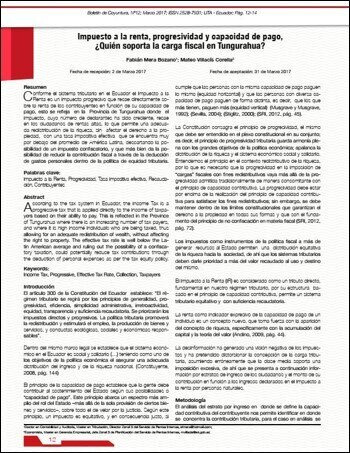Income Tax, progressivity and ability to pay, who supports the tax burden in Tungurahua?
Main Article Content
Abstract
According to the tax system in Ecuador, the Income Tax is a progressive tax that is applied directly to the income of taxpayers based on their ability to pay. This is reflected in the Province of Tungurahua where there is an increasing number of tax payers, and where it is high income individuals who are being taxed, thus allowing for an adequate redistribution of wealth, without affecting the right to property. The effective tax rate is well below the Latin American average and ruling out the possibility of a confiscatory taxation, could potentially reduce tax contributions through the deduction of personal expenses as per the tax equity policy.
DOI: https://doi.org/10.31164/bcoyu.12.2017.624
URL: http://revistas.uta.edu.ec/erevista/index.php/bcoyu/article/view/624
Downloads
Article Details

This work is licensed under a Creative Commons Attribution-NonCommercial 4.0 International License.
![]()
The publications of the Boletín de Coyuntura are licensed under a Creative Commons Attribution-NonCommercial 4.0 International License (CC BY-NC 4.0). The Universidad Técnica de Ambato retains the copyright of the published works, and favors and allows the reuse of these, as long as: the authorship and original source of publication is cited, and they are not used for commercial or onerous purposes. The intellectual property of the published articles belongs to the authors.
References
Andino, M. (2009). Hacia un nuevo sistema de imposición directa. Cuadernos de formación, 49.
CEPAL. (2016). Tributación para un crecimiento inclusivo. 19.
Constituyente, A. (2008). Constitución del Ecuador. Montecristi, Ecuador.
SRI. (2012). Una nueva Política Fiscal para el Buen Vivir. Quito: Abya-Yala.


